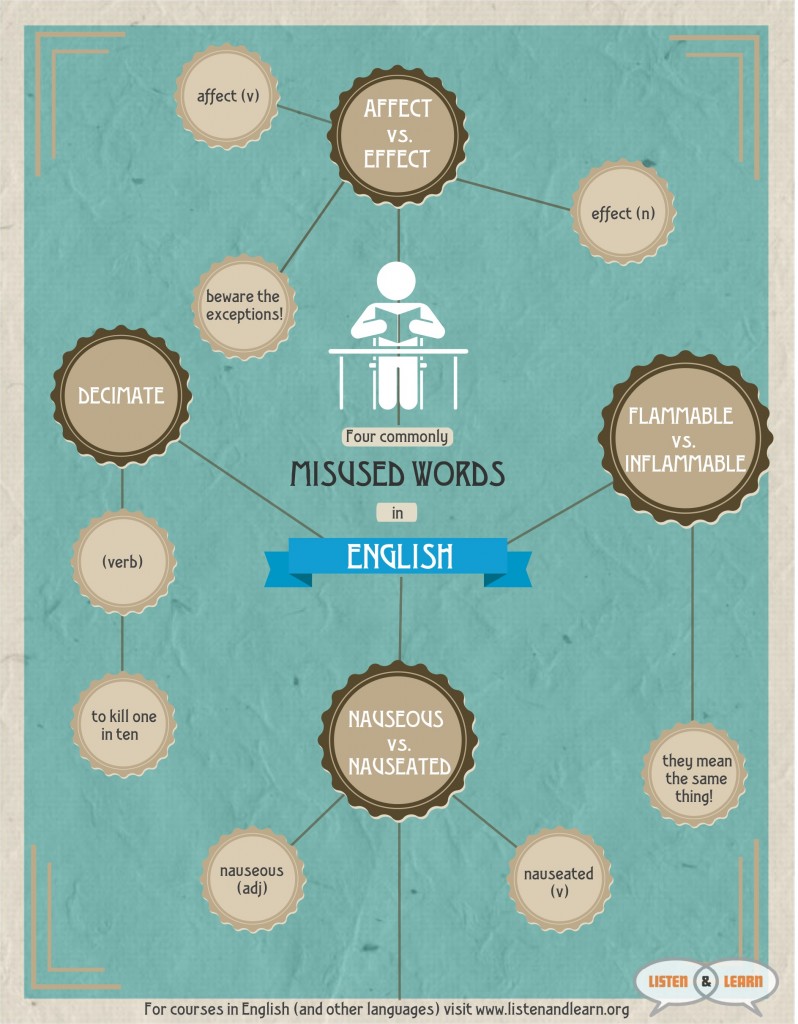4 Words In English You Might Be Misusing
The English language, like any living language, is fluid. It changes to adapt to the needs of the speakers that use it – old words get thrown out, new ones get tossed in, and meanings get jumbled and confused. It can be frustrating for the language sticklers of the world when so many people misuse a word so often that it starts to become somewhat acceptable. And though at some point they’ll have to accept that words and their meanings can change, for now, here are four words that you might be misusing.
For those of you still learning English, nip these bad habits in the bud and contact us to find an expert English tutor near you!
***
Affect/Effect:
These two are very similar, and they’re often confused with one another, but there are a couple of rules you can follow that might help you out.
Usually, not always, affect is used as a verb and effect as a noun. For instance: “The leftover Mexican food I ate for lunch affected my stomach for days.” versus, “The effects of the leftover Mexican food I ate for lunch lasted for days.”
However, there are exceptions – a board of directors at a company can effect a change in the leave policy for their employees.
For the most part, though, follow the rule: affect = verb; effect = noun; and if you’re worried that you might have it wrong, check with an expert.
Decimate:
Here’s a word that’s interestingly used incorrectly – although, it’s one of those that’s more than likely going to change in just a few years – and most people don’t even realize it.
Commonly used as a synonym for annihilate – as in, to utterly destroy – its historical definition stems from ancient Rome. Back in the day, decimation was a form of military punishment for capital offences that involved large groups –usually hundreds – of soldiers. It comes from Latin meaning “removal of a tenth”. Wrongdoers were divided into groups of ten and forced to do a lottery draw. Whoever pulled the short stick was beaten to death by the remaining nine offenders.
Ancient Rome was hectic. Nowadays, most people don’t use it this way – they probably classify that as cruel and unusual punishment in the justice system– and online thesauruses list it as a synonym for exterminate, but if you’re worried, try devastate instead.
Already have a good grasp on the English language? Test your skills with our free English level test!
Nauseous/Nauseated:
We can all be culprits of this little linguistic faux pas. Just to quickly clarify: nauseous: something that inspires you to regurgitate your lunch, nauseated: the feeling of wanting to.
“The fumes emanating from the garbage can on the street corner were nauseous, and nauseated by them, I decided to pass on the Mexican food for lunch.”
You can use them interchangeably and whomever you’re speaking to will get the gist, but if you’re looking to be grammatically correct, think: nauseated = how you feel; nauseous = the thing making you feel nauseated.
Flammable/Inflammable:
These two are in here not because people use them incorrectly, but because most people don’t actually know the difference between the two. And why is that? Because there is no difference. That’s right.
Flammable and inflammable both mean something is capable or easy to burn or ignite. The reason for both of them? Well, it turns out inflammable was around first – it can be traced back as far as 1605 – but sometime in the 1920s, the National Fire Protection Association started urging people to use flammable.
Because of the prefix in-, which commonly refers to the Latin un-meaning non, the association was concerned that people might start thinking inflammable meant something that would not catch on fire. And a dangerous mistake that would be. Inflammable actually comes from the Latin in meaning “in” in English and flamma meaning “flames” – literally “in flames.”
Better safe than sorry though, wouldn’t you say? So, now either one is technically accurate when you’re talking about something that can catch on fire. And for the record, if you mean it can’t catch on fire, non-flammable is the way to go.
***
Learning a language can be hard, and English has all kinds of irregularities that make it difficult, but if you keep these bad boys in mind, you’ll be that much closer to mastering it. And for those of you for whom English is your native language (or even if it’s not!) – think about all the fun words speakers of other languages use incorrectly, and check out our list of language courses that are available near you!



